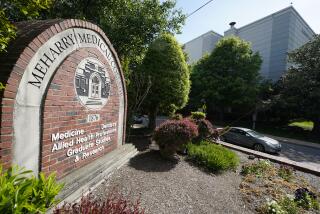Would-Be Donors Get a Personal Thank You : Medicine: Leukemia patient and his mother travel from Kansas to meet the Wilmington youths who volunteered for bone marrow transplant program.
- Share via
When Tami Brown, director of the National Bone Marrow Donor program, went to the Wilmington Teen Center this summer to talk to youths about her program, she found a room full of street-wise teen-agers staring at her coldly.
“There I was trying to talk to kids--some who have carried knives or guns--and I felt completely inept,” she said. “But I knew that if I could personalize it, I knew they would be moved.”
So she told them about Ruben.
Fourteen-year-old Ruben Molina of Wichita, Kan., has leukemia and will most likely die if he does not get a bone marrow transplant.
“I told them he’s got to have a donor; he’s got to have a Mexican-American donor. That room was dead silent when I was done. Two guys came up and wanted to donate right then and there,” she said.
The youths spread the word on the streets and organized a donor drive in September in which 57 young men donated two tablespoons of blood each to be tissue-typed. No one from the drive has been matched with Ruben, but Friday, Ruben and his mother, Delores Laredo, came from Kansas to thank the youths for trying.
Standing beneath a banner that said, “Welcome Ruben, God Bless You,” Laredo thanked the small group gathered at the Wilmington Teen Center on behalf of Ruben and other children with leukemia.
“I used to have a negative attitude toward gang members, but this really has changed my mind,” she said. Many who donated blood samples were not at the small ceremony, but those who did attend were visibly moved, hugging Laredo, tears in their eyes.
Molina was diagnosed in April and since then, Laredo and her husband have been on a mission to find a donor for her son.
“Our lives have been turned upside down--and we’re tired. But we do it because we have to,” she said.
The reason that more people do not volunteer to become bone marrow donors is because they are unaware of how simple it is, she said.
“They either think that someone’s going to take some bone from them because they hear ‘bone marrow’ or they’re afraid it’s going to hurt or they’re afraid of needles,” she said. “Sure you’re going to be sore a few days, but think of what you give--you give life.”
Ruben, a slim, quiet youth in jeans and a green baseball cap, said he has learned to listen to conversations about his health without letting it depress him.
“I can’t do all the things I used to do--like sports. But I tend to put the bad things in the back of my head and the good things in the front,” he said.
Kansas Gov. Joan Finney has declared Nov. 7, Ruben’s birthday, to be Bone Marrow Day in Ruben’s honor, and both he and his mother hope the event there will encourage people to be donors.
Ruben is undergoing chemotherapy treatments to which he is responding fairly well, Laredo said. Doctors, however, give him only a 30% chance of being completely cured by those treatments alone.
About 9,000 people nationwide need bone marrow transplants. The donor program, based in Minneapolis, has 650,000 volunteers registered. Donors must be between 18 and 55, and matches are almost always made between people of the same ethnic group.
Family members, of course, are the most likely donors to make a tissue match. Among unrelated donors, however, the odds are 20,000-to-1 of being compatible, according to donor program statistics.
“My hopes have always been high because I have God on my side,” Laredo said. “He’s prepared us for this,” she said. Ruben, hands folded, listened to his mother, eyes on the floor.
“But then, either way, we can’t lose,” she said, mustering a smile for Ruben. “After all, what’s so bad about going to heaven?”
More to Read
Sign up for Essential California
The most important California stories and recommendations in your inbox every morning.
You may occasionally receive promotional content from the Los Angeles Times.













